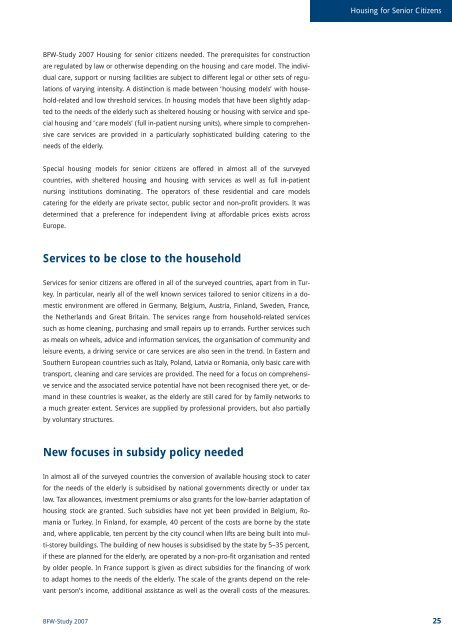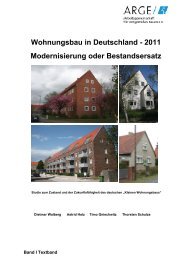BFW-Studie - European Union of Developers and House Builders
BFW-Studie - European Union of Developers and House Builders
BFW-Studie - European Union of Developers and House Builders
Create successful ePaper yourself
Turn your PDF publications into a flip-book with our unique Google optimized e-Paper software.
Housing for Senior Citizens<br />
<strong>BFW</strong>-Study 2007 Housing for senior citizens needed. The prerequisites for construction<br />
are regulated by law or otherwise depending on the housing <strong>and</strong> care model. The individual<br />
care, support or nursing facilities are subject to different legal or other sets <strong>of</strong> regulations<br />
<strong>of</strong> varying intensity. A distinction is made between ‘housing models’ with household-related<br />
<strong>and</strong> low threshold services. In housing models that have been slightly adapted<br />
to the needs <strong>of</strong> the elderly such as sheltered housing or housing with service <strong>and</strong> special<br />
housing <strong>and</strong> ‘care models’ (full in-patient nursing units), where simple to comprehensive<br />
care services are provided in a particularly sophisticated building catering to the<br />
needs <strong>of</strong> the elderly.<br />
Special housing models for senior citizens are <strong>of</strong>fered in almost all <strong>of</strong> the surveyed<br />
countries, with sheltered housing <strong>and</strong> housing with services as well as full in-patient<br />
nursing institutions dominating. The operators <strong>of</strong> these residential <strong>and</strong> care models<br />
catering for the elderly are private sector, public sector <strong>and</strong> non-pr<strong>of</strong>it providers. It was<br />
determined that a preference for independent living at affordable prices exists across<br />
Europe.<br />
Services to be close to the household<br />
Services for senior citizens are <strong>of</strong>fered in all <strong>of</strong> the surveyed countries, apart from in Turkey.<br />
In particular, nearly all <strong>of</strong> the well known services tailored to senior citizens in a domestic<br />
environment are <strong>of</strong>fered in Germany, Belgium, Austria, Finl<strong>and</strong>, Sweden, France,<br />
the Netherl<strong>and</strong>s <strong>and</strong> Great Britain. The services range from household-related services<br />
such as home cleaning, purchasing <strong>and</strong> small repairs up to err<strong>and</strong>s. Further services such<br />
as meals on wheels, advice <strong>and</strong> information services, the organisation <strong>of</strong> community <strong>and</strong><br />
leisure events, a driving service or care services are also seen in the trend. In Eastern <strong>and</strong><br />
Southern <strong>European</strong> countries such as Italy, Pol<strong>and</strong>, Latvia or Romania, only basic care with<br />
transport, cleaning <strong>and</strong> care services are provided. The need for a focus on comprehensive<br />
service <strong>and</strong> the associated service potential have not been recognised there yet, or dem<strong>and</strong><br />
in these countries is weaker, as the elderly are still cared for by family networks to<br />
a much greater extent. Services are supplied by pr<strong>of</strong>essional providers, but also partially<br />
by voluntary structures.<br />
New focuses in subsidy policy needed<br />
In almost all <strong>of</strong> the surveyed countries the conversion <strong>of</strong> available housing stock to cater<br />
for the needs <strong>of</strong> the elderly is subsidised by national governments directly or under tax<br />
law. Tax allowances, investment premiums or also grants for the low-barrier adaptation <strong>of</strong><br />
housing stock are granted. Such subsidies have not yet been provided in Belgium, Romania<br />
or Turkey. In Finl<strong>and</strong>, for example, 40 percent <strong>of</strong> the costs are borne by the state<br />
<strong>and</strong>, where applicable, ten percent by the city council when lifts are being built into multi-storey<br />
buildings. The building <strong>of</strong> new houses is subsidised by the state by 5–35 percent,<br />
if these are planned for the elderly, are operated by a non-pro-fit organisation <strong>and</strong> rented<br />
by older people. In France support is given as direct subsidies for the financing <strong>of</strong> work<br />
to adapt homes to the needs <strong>of</strong> the elderly. The scale <strong>of</strong> the grants depend on the relevant<br />
person’s income, additional assistance as well as the overall costs <strong>of</strong> the measures.<br />
<strong>BFW</strong>-Study 2007 25










